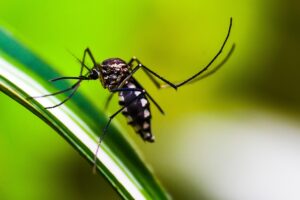The 50-year-old Pandemic

On June 10, 2021, BBC reported that a new discovery reduces the rate of Dengue infections by 77%. The World Mosquito Programme performed an experiment whereby mosquitoes were infected with the Wolbachia bacteria that outcompeted the Dengue virus (DENV). These Wolbachia-laced mosquitoes and their eggs were re-released into Yogyakarta city in Indonesia. The World Mosquito Program proudly reported that this trial results in an 86% reduction in Dengue hospitalizations. And in a world that has health care systems non the verge of collapse from the COVID-19 pandemic, reducing the overall burden on hospitals makes a big difference.
What is Dengue? It is a virus passed onto humans by female mosquitoes (in the pic, from pixabay.com) when they feed early morning and early evening. Symptoms include high fever (40oC), severe headaches, nausea, severe abdominal pain, persistent vomiting of blood, bleeding gums, respiratory distress and organ failure. It is also known as “break-bone fever” due to severe muscle and bone pain. Dengue is described as “hemorrhagic fever” when the person goes into shock and severe forms may even entail vaginal and intracranial bleeding. Blood ,transfusions may be required. Ebola is also Viral Hemorrhagic Fever (VHF). Get the picture?
Up to 400 million people contract Dengue on an annual basis. It is estimated to cause a dent of $110.17 million USD per year in one study in Saudi Arabia and the patient is saddled with $11,947.60 USD.
There is a vaccine for Dengue, but here’s the catch – it is only applicable to those who have been previously infected by Dengue. If you have never contracted Dengue and you take the Dengue vaccine as a precautionary measure, you may actually end up developing severe Dengue. In a world struggling with vaccine hesitancy in light of the COVID-19 pandemic, this isn’t the sort of thing that you need to hearing, that a vaccine is going to make you sicker.
The Government of Canada outlines an extensive list of preventative measures, namely wearing light-coloured clothing, secure netting and screens for the household and obviously, insect repellent. Steering clear of stagnant water is a must. Steering clear of countries where this disease is endemic, another must.
While it is easy to attribute Dengue as a mere tropical disease, nay “an Asian problem” given that 70% of the cases lie therein, the creative mind must look beyond the obvious and accept that we live in an ever-changing world. Consider this train of thought: Toronto lines up with the same latitude as the South of France (believe it or not) and therefore, we must share similarities in seasonal climate.
In August 2020, Dengue was reported in Cessenon-sur-Orb, South of France. HealthLink BC explains that Dengue is rare in Canada and the United States, but there have been cases in the Texas-Mexico border and Florida. Sure enough, just one day ago, on June 10, 2021, the following headline hit the news: “Severe Dengue Cases Confirmed in Florida”.
Dengue is inching its way closer to our front doorstep. As WHO put it, “half of the world’s population is now at risk”.


